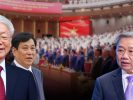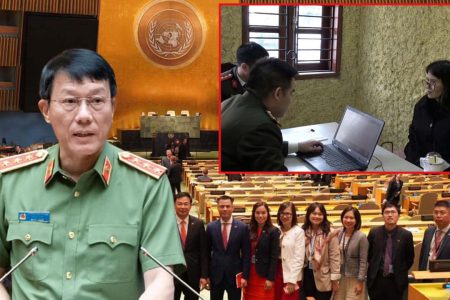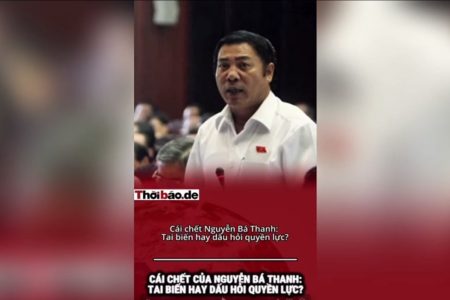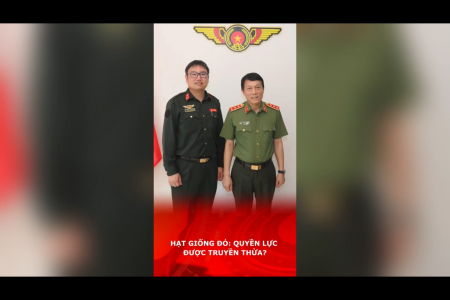
Answering questions of the National Assembly on the morning of November 10, Chief Justice of the Supreme People’s Court Nguyen Hoa Binh affirmed that the independence of judges and jurors is always ensured. However, according to the opinion of some lawyers, the situation of „directing judgment“ still occurs a lot in the Vietnamese legal system.
Specifically, national legislator Do Ngoc Thinh asked during the questioning session that in the trial, is there still the phenomenon of judges asking for opinions of the Court’s leaders? Does the leader of the Court have inappropriate administrative instructions on procedural relations and if so, how?
Mr. Nguyen Hoa Binh replied: “The court respects the independent trial of the lower court, there is no intervention.
As for the problem that local people are confused about the application of the law, they ask in this case which law to apply, we guide the application of the law when there are different interpretations about a law content.
We cannot direct the judgment with a letter but have to study the original file.“
Directing judgment due to corruption, bribery
Attorney Ha Huy Son responded to RFA from Hanoi that he had no evidence that the superior court „directed the judgment“ the lower courts. However, anyone working in the court profession knows that:
“In fact, I don’t have any evidence or documents about how the superior courts direct their subordinates. Because sometimes people direct by mouth or by phone, but they don’t keep it on file. Therefore, if we say according to the evidence, we cannot deny what Mr. Nguyen Hoa Binh said.
But in reality, everyone in the court system admits it is obvious there is direction above.“
Commenting on his personal page, lawyer Nguyen Duy Binh said that “Mr. Nguyen Hoa Binh has not looked directly at the truth and has not acknowledged the truth about the situation of directing the sentence. He should have frankly admitted and build methods for correction.„
Legal doctor Cu Huy Ha Vu, from the US, affirms with certainty that Nguyen Hoa Binh’s statement is completely untrue. For the following reasons:
“The first thing is that the current political regime in Vietnam is a totalitarian one. In particular, the Vietnamese Constitution has affirmed that all activities of the State, as well as society, are under the leadership of the Communist Party of Vietnam. Therefore, no activity of the State is outside the direction of the Communist Party, whether it is executive, legislative as well as judicial activity in the courts, and even the Procuracy.
The second problem is the practice in Vietnam showing that injustice is rampant and the courts in many places have admitted this. It is because of the direction of the superior courts to the lower courts. So, if something goes wrong or is appealed, then the superior courts will hear it again. I would say that in Vietnam there is no independence between the three branches of the executive, legislature, and the judiciary. So it is natural to direct intervention in the judicial field.“
Mr. Cu Huy Ha Vu said that through personal experience, who has participated in many cases, including defending clients in court, he realized that he has noticed the fact that the lower court reports to the higher court, also known as „report„, that is to present the content of the case and propose to judge according to the crime, how heavy the fine. After viewing the proposal, the superior court will approve the judgment.

There is a „hook-up“ between the subordinates and the superiors, he said. For example, if their subordinates receive a bribe for a case, they will ask the higher court to consider it. And of course, the higher court must receive a sum of money from the lower court. Therefore, the superior court will direct how.
Mr. Vu shared that there have been a number of judges, investigative agencies, including the police, directly negotiate with him on the trial results. According to him, once a judge or investigative agency actively sets the price, it means there is a system of corruption and bribery behind.
Directing the case in Political cases more closely
In the past, many human rights activists have often accused that the results of „national security“ cases in Vietnam often being directed as „a pocket sentence.“
Former prisoner of conscience, lawyer Nguyen Van Dai from Germany said 100% of all political cases have „directing sentences.“ These court hearings are only for the purpose of „acting“ for full procedures:
“Interfering with the jury is natural. In particular, in political cases or sensitive corruption cases, there will be the intervention not only of the superior court, but also the intervention of the Ministry of Public Security, the People’s Procuracy, and the Internal Affairs Department of the ruling party.
When I have not yet been arrested, I already know how many years my prison term will be. The sentence for political activists like us is not decided by the Procuracy or the Court but by the Ministry of Public Security. The court was just the place to reenact all the scripts they had arranged before.”

Mr. Cu Huy Ha Vu analyzed, for the types of cases with „political color,“ although there is no bribery or corruption, the direction of the sentence must be stricter:
“Also, a number of political causes. For example, cases involving people who have activities to fight for democracy and human rights in Vietnam. These are considered by the Vietnamese courts as well as the Vietnamese political system as serious cases of infringing upon national security.
Of course, in these cases, there would be no bribery. Because, it can be said that the political activists are basically nothing they commit themselves, so there is no money involved. So the courts that are assigned to hear political cases only „report“ and are „approved“ on how many years of imprisonment, and in what form.“
The second, as we have recently learned, General Secretary of the Communist Party of Vietnam Nguyen Phu Trong has launched a large-scale and robust anti-corruption campaign known as „burning the furnace.“
There have been many very high ranking officials, even Politburo’s members like Dinh La Thang, and in the near future, Nguyen Van Binh will be tried.
In these political cases where the Communist Party punishes officials in its political system, the more „resentment“ and ‘judgment’ are carried out in a very strict manner and careful consideration to make a judgment.
The convicts are those who hold power, even at the highest levels in the Vietnamese political system, a series of crumpled relationships that are corrupt. It makes the leaders take action to ‘punish’ corruption to consider.“
Lawyer Ha Huy Son, with his experience and feeling, has justified many political cases, although there is no concrete evidence, he also believes that „a pre-existing directive arrangement for the national security case is completely real.
According to Clause 2, Article 103 of the 2013 Constitution, “Judges and jurors are independent and only obey the law; agencies, organizations, and individuals are strictly forbidden to interfere in the adjudication of Judges and jurors.“
Thoibao.de (Translated)


























